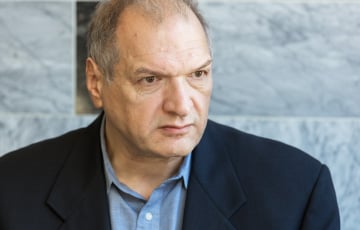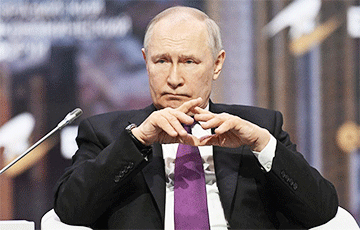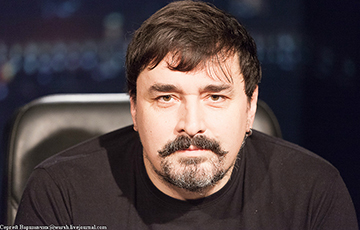Putin's Belarusian Bridgehead
20- Yuri Felshtinsky
- 1.06.2023, 10:07
- 28,338

PHOTO: CHARTER97.ORG
The defeat of Russia is more correct to start with the liberation of Belarus.
The Russian military campaign of 2022 began with the occupation of Belarus, with the concentration of Russian troops there, and with an attack on Ukraine from the north, from
Belarus, in the direction of Kyiv. Accordingly, victory over the Russian Federation and the end of the Russian-Ukrainian war is impossible without the liberation of Belarus. In what sequence the liberation of Belarus will take place - before, during, or after the liberation of the occupied Ukrainian territories - is not very important after all. However, the defeat of the Russian Federation is more correct to start with the liberation of Belarus, since due to the planned deployment of Russian nuclear weapons there, the European community is in a state of deadlock and the prevention of the nuclear threat emanating from Belarus becomes a priority, overshadowing the desired speedy liberation of the occupied Ukrainian territories, including Donbas and Crimea, from the Russian aggressor. With the loss of Belarus, the Russian invasion of Ukraine loses any meaning in military and strategic terms. For this reason, Putin began his aggression by occupying Belarus and is now trying to turn this country into a springboard not only for a new offensive against Kyiv but also for a nuclear strike on Europe.
There are two options for a nuclear escalation of Russia's current aggression. Neither of them looks safe for Europe.
The first option has already been voiced by Putin himself, even with some dates, like "July 1", by which "storage facilities" for nuclear missiles will be built in Belarus. On 25 May in Minsk, the two countries’ defense ministers signed "documents" on the deployment of nuclear weapons in Belarus. In fact, the intention to deploy nuclear weapons did not have to be declared openly, or even by Putin himself. There was no need to sign the "documents" on the deployment of these weapons publicly either. During the Cuban Missile Crisis in 1962, the Soviet government secretly tried to deploy nuclear weapons in Cuba and denied all intentions. During the invasion of Crimea and later of Donbas, Putin claimed that Russian troops were not involved in the aggression. Why, on the contrary, is Russia now openly talking about transferring nuclear weapons to Belarus?
Let's start with some contradictions. According to the Treaty on Non-Proliferation of Nuclear Weapons of 1995, Russia has no right to transfer nuclear weapons to other countries. It is for this reason that Russia seems to be stressing the fact that the weapons will be under the control of the Russian defense ministry. However, on 4 April, Shoigu said that "some of the Belarusian attack aircraft had acquired the ability to strike enemy targets" specifically with nuclear weapons. The reference was to the modification of the Belarusian Su-25 aircraft. Simultaneously, the Belarusian army received Iskander-M missiles capable of striking with nuclear warheads. As soon as Russia installs nuclear weapons on the Belarusian Iskanders-M and Su-25, it will, in fact, violate the 1995 treaty, because it will transfer nuclear missiles to the Belarusian army.
But let us return to the question of why, instead of the usual manner of doing everything secretly and without admitting anything, the Russian leadership reports to the world community about every step it has taken with regard to the transfer of nuclear weapons to Belarus. The fact is that it is not Russia that will launch a nuclear strike from Belarus against Europe, but Belarus. Or even…
Or even Belarusian planes with Russian nukes will be piloted by pilots with real Ukrainian passports, Ukrainian citizens from Crimea and Donbas occupied back in 2014, and the operators of Belarusian Iskander-M will also be real Ukrainian citizens with real Ukrainian passports. Their names and documents will be given later. Then another "active measure of the Russian security services" will commence, of which we have seen many in recent years: the professionally created legends about "saboteurs from Ukraine" will be planted in the press, who were sent by the VSU to the enemy's rear (in Belarus) to seize Russian nuclear weapons and deliver nuclear strikes on Europe with provocative purposes - to provoke a nuclear conflict between Russia and NATO.
Perhaps, no one will believe these tales of the leaders of the West except Viktor Orbán (neither will Orbán, but he will pretend to believe them), and Belarus will be hit back anyway, with all consequences…
I have described the mildest scenario. Because there is another one: firstly, to redeploy "tactical nuclear weapons", then, under the security of Su-25 and Iskanders-M to Belarus to redeploy strategic nuclear weapons and additional tactical ones (which Russia has about 2000), and then to organize a show with "Saboteurs from VSU", but on a larger scale.
There is only one way out of this situation: to start immediate military operations against Lukashenka's regime, first and foremost, by the Belarusian volunteer units that are already fighting in Ukraine as part of the VSU against the Russian aggressors. Of course, if the Belarusian volunteers are assisted by the VSU and NATO countries, the liberation of Belarus will be swift and bloodless. At the same time, NATO should not expect Russia to retaliate. Because of Belarus, neither NATO will risk a thermonuclear war with Russia, nor Russia, respectively, will risk a nuclear clash with the United States. In other words, Russia will not declare war on NATO because of an invasion of Belarus. If it wanted to do so, there would be no need for Putin's hybrid stratagems with the deployment of nuclear weapons in Belarus.
But the risk of a nuclear strike from Belarus on Europe is so great that it requires a preventive solution to the emerging deadly threat. Today the Lukashenka regime can be overthrown with bare hands. Once nuclear weapons are deployed in Belarus, this task may become locally unfeasible and will have to be resolved in an open military conflict between Russia and NATO. In that case, a much higher price would have to be paid for freeing Belarus from Lukashenka.
Yuri Felshtinsky, especially for Charter97.org











